Choosing the right eCommerce platform can feel overwhelming, especially when every option promises to make selling online easier. Maybe you’re stuck deciding between Volusion vs Ecwid; both seem good, but which one really fits your business needs?
If this is you, our article is here to help. We will compare all the key aspects between Ecwid vs Volusion:
- Pricing;
- Ease of use;
- Themes & customization;
- eCommerce features;
- SEO & marketing;
- Apps & integration;
- Security & performance;
- Support & customer service.
By the end, you’ll know exactly which platform is the better fit for your store so you can make a confident decision without second-guessing. Let’s get started!
Overview of Volusion vs Ecwid
What is Volusion?
Volusion is a long-standing eCommerce platform that launched in 1999, offering an all‑in‑one solution. It was once a popular choice for online businesses, but its popularity began to decline around 2013 as more modern platforms like Shopify and BigCommerce entered the market.

In 2020, Volusion filed for Chapter 11 bankruptcy protection after financial struggles were worsened by the COVID-19 pandemic. Despite this setback, the platform continued to operate and support existing stores.
Today, this decline is evident in its market presence, with only about 5,000 live Volusion websites. To regain competitiveness, Volusion has rolled out updates like premium checkout, an upgraded site designer, a refreshed help center, and an improved login experience, aiming to modernize the platform and keep pace with evolving user expectations.
What is Ecwid?
Originally created as a simple “eCommerce widget”, Ecwid lets businesses easily add an online store to an existing website. After Lightspeed acquired it in 2021, the platform expanded its features and integrations, evolving into a comprehensive eCommerce solution that can now run independently.
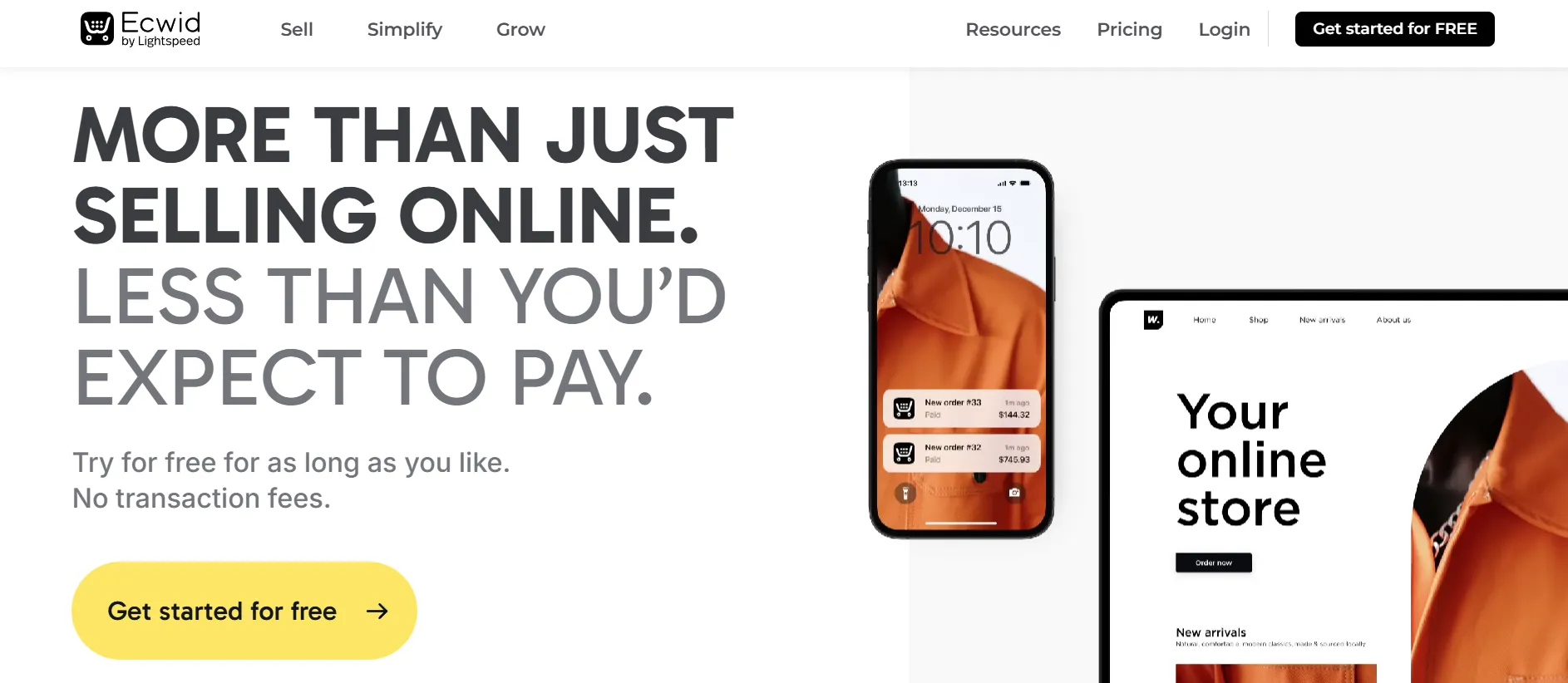
Today, you can either embed Ecwid into your current site or build a standalone store using its built‑in tools. This flexible approach has paid off, with the platform now powering over 800,000 live websites. Its user base continues to grow as more small businesses seek simple, affordable ways to sell online.
Pros & Cons of Volusion vs Ecwid
Pros | Cons | |
Volusion | - Volusion has an easy-to-use interface, making store management simple even for beginners. - The platform charges no transaction fees, helping merchants keep more profit. - It provides robust eCommerce tools for store management. | - Volusion has a smaller app marketplace with limited integration options compared to modern platforms. - It lacks advanced features like subscriptions, multilingual support, and automated taxes. - Pricing is higher than some competitors and there’s also a maximum GMV limit per year. |
Ecwid | - Ecwid can easily embed into any existing website without the need to rebuild your store. - It supports multilingual and multi-currency stores, making it ideal for international selling. - It has a modern interface that is easy for beginners to navigate. | - Ecwid limits product numbers on lower plans, with unlimited only on the highest tier. - Design customization is still basic compared to fully hosted platforms. |
Volusion vs Ecwid: A Detailed eCommerce Comparison on All Aspects
Before we dive into the details, here’s a quick side-by-side comparison of all the key aspects between Volusion vs Ecwid:
Criteria | Volusion | Ecwid | Winner |
Pricing | Higher entry cost with sales caps starting from $35/month to over $299/month if billed annually. | More affordable entry points at $5/month and go up to $105/month if billed annually. | Ecwid |
Ease of use | Simple setup with a wizard, but dashboard feels dated. | Modern, clean interface with a guided setup that’s easier for beginners. | A tie |
Themes & customization | Offers free and paid themes with a basic drag-and-drop Site Designer; limited flexibility. | Larger library of free templates with a more modern builder. | Ecwid |
Marketing & SEO | Covers basic SEO and marketing but lacks depth and multichannel selling. | Stronger marketing tools with social selling, SEO enhancements, and marketplace integrations. | Ecwid |
Apps & integration | Has a small marketplace with around 80 apps. | Offers a larger marketplace with 300+ apps. | Ecwid |
Security & performance | SSL included, PCI compliant, but infrastructure feels a bit dated. | SSL included, PCI compliant, and hosted on modern cloud infrastructure for better performance. | A tie |
eCommerce features | Unlimited products on higher plans, but lacks subscriptions and global selling tools. | Supports subscriptions, multilingual stores, and global tax handling; product limits on lower plans. | Ecwid |
Customer support | Live chat and email support; slower response times and fewer resources. | More responsive support with an updated help center and active community forum. | Ecwid |
1. Pricing
The Verdict:
When comparing Volusion vs Ecwid in terms of pricing, Ecwid clearly offers better value. It has no sales caps, more affordable entry points, and scales more gently as your business grows.
Volusion pricing
Volusion follows a traditional pricing model that ties each tier not only to features but also to annual sales volume. The following price is charged for each plan if you subscribe annually:
- Personal ($35/month): Best for very small stores just starting out. Supports up to $50K in annual sales with a 100-product limit and basic support.
- Professional ($79/month): Suitable for growing small businesses. Raises the sales cap to $100K and allows up to 5,000 products with more staff accounts.
- Business ($299/month): Aimed at established stores. Increases the sales limit to $400K, removes product limits, adds more staff accounts, and includes phone support.
- Prime (Custom pricing): Ideal for high-volume or enterprise sellers. No limits on sales, products, or staff accounts, plus VIP support.
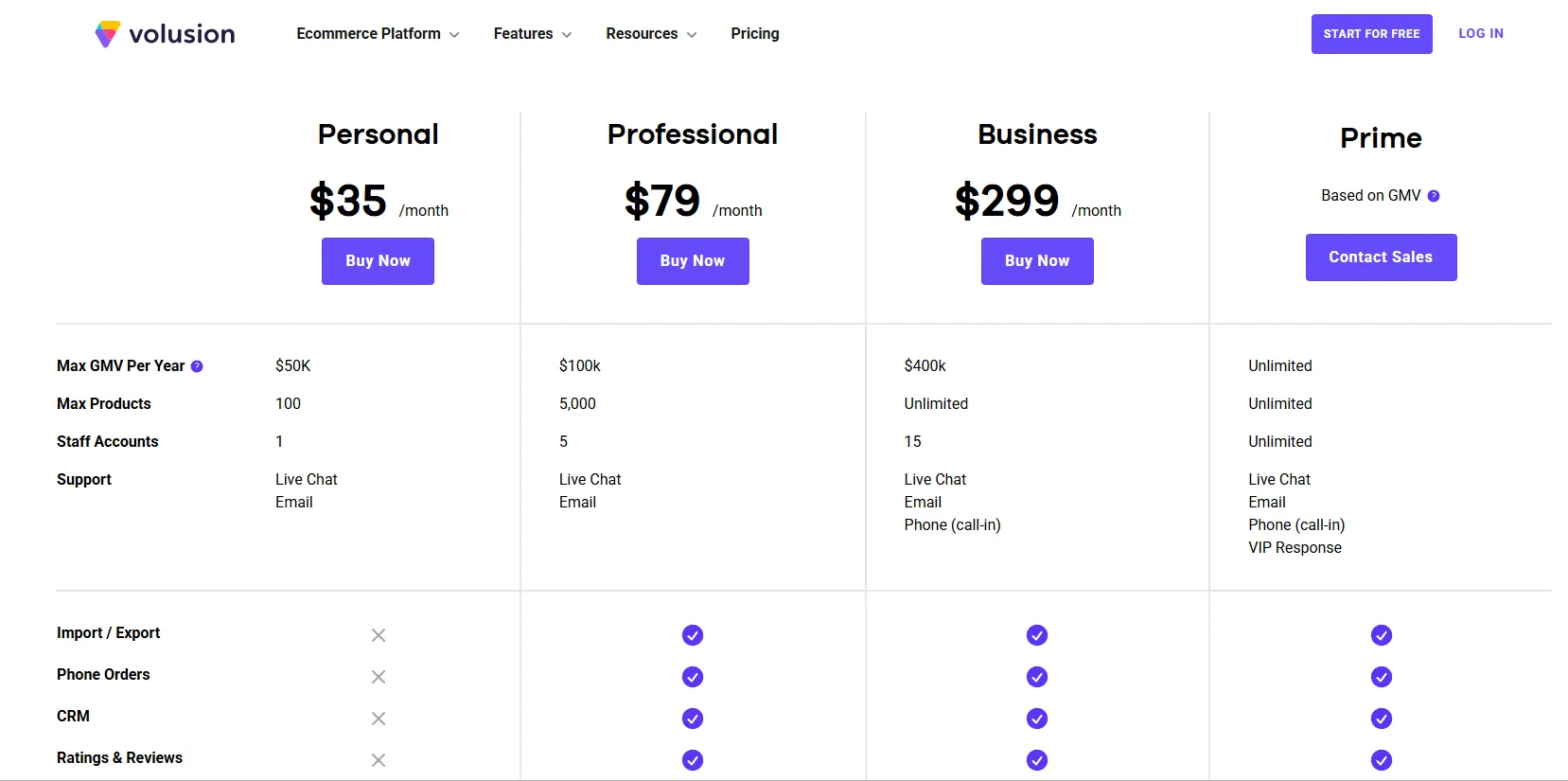
From a value perspective, Volusion feels less flexible. The sales caps can become restrictive as your store grows, even if you don’t necessarily need the extra features of a higher plan. Also, upgrading to higher plans gets expensive quickly, especially the Business plan, which costs much more than comparable options on other platforms.
Ecwid pricing
Ecwid’s pricing is designed to be flexible, making it easy for small businesses to start selling online and then scale up as they grow. If you choose annual billing, you’ll save 16% compared to paying monthly. The plans listed below reflect the annual pricing:
- Starter ($5/month): Great for absolute beginners who want to test selling online with just a few products. It’s minimal but gets the job done if you’re starting small.
- Venture ($25/month): A solid choice for small businesses that want to list more products and start selling on social media like Instagram or Facebook. It offers enough tools to feel like a “real” online store without being overwhelming.
- Business ($45/month): Best suited for growing stores. This plan unlocks more advanced features like selling subscriptions, connecting to marketplaces, and recovering abandoned carts.
- Unlimited ($105/month): Designed for established businesses that need no product limits, POS integration for in-person sales, unlimited staff accounts, and priority support. It’s a scalable solution that can handle more complex operations.
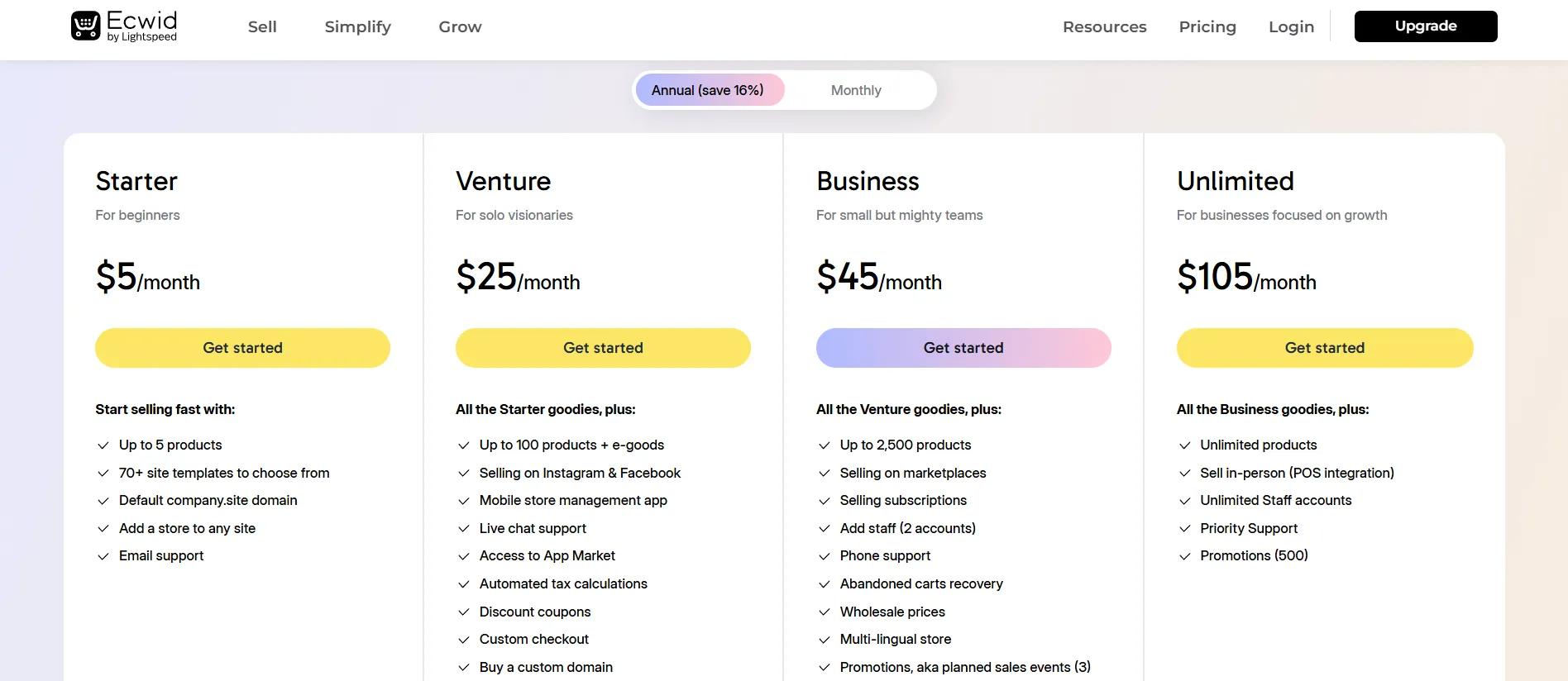
From our perspective, Ecwid’s pricing is designed to minimize risk for smaller sellers while still offering sufficient depth to scale. There are no artificial sales caps, so you’re not forced to upgrade just because your revenue grows.
What really sets Ecwid apart is its low barrier to entry. It allows businesses to start selling online with minimal commitment and gradually invest more as they see results. Even at the higher tiers, the cost stays competitive compared to many traditional eCommerce platforms.
2. Ease of use
The Verdict
In terms of ease of use, Volusion vs Ecwid are evenly matched for getting started. Volusion’s wizard-like setup is straightforward, but Ecwid offers a cleaner, more modern interface that feels smoother to navigate, especially for first-time users.
Volusion ease of use
Setting up an account with Volusion is quite straightforward. The platform uses a wizard-like onboarding flow that guides you through the basics step by step. You can choose a template, upload your logo, and add your first products quickly, so most users can have a simple store ready within minutes.
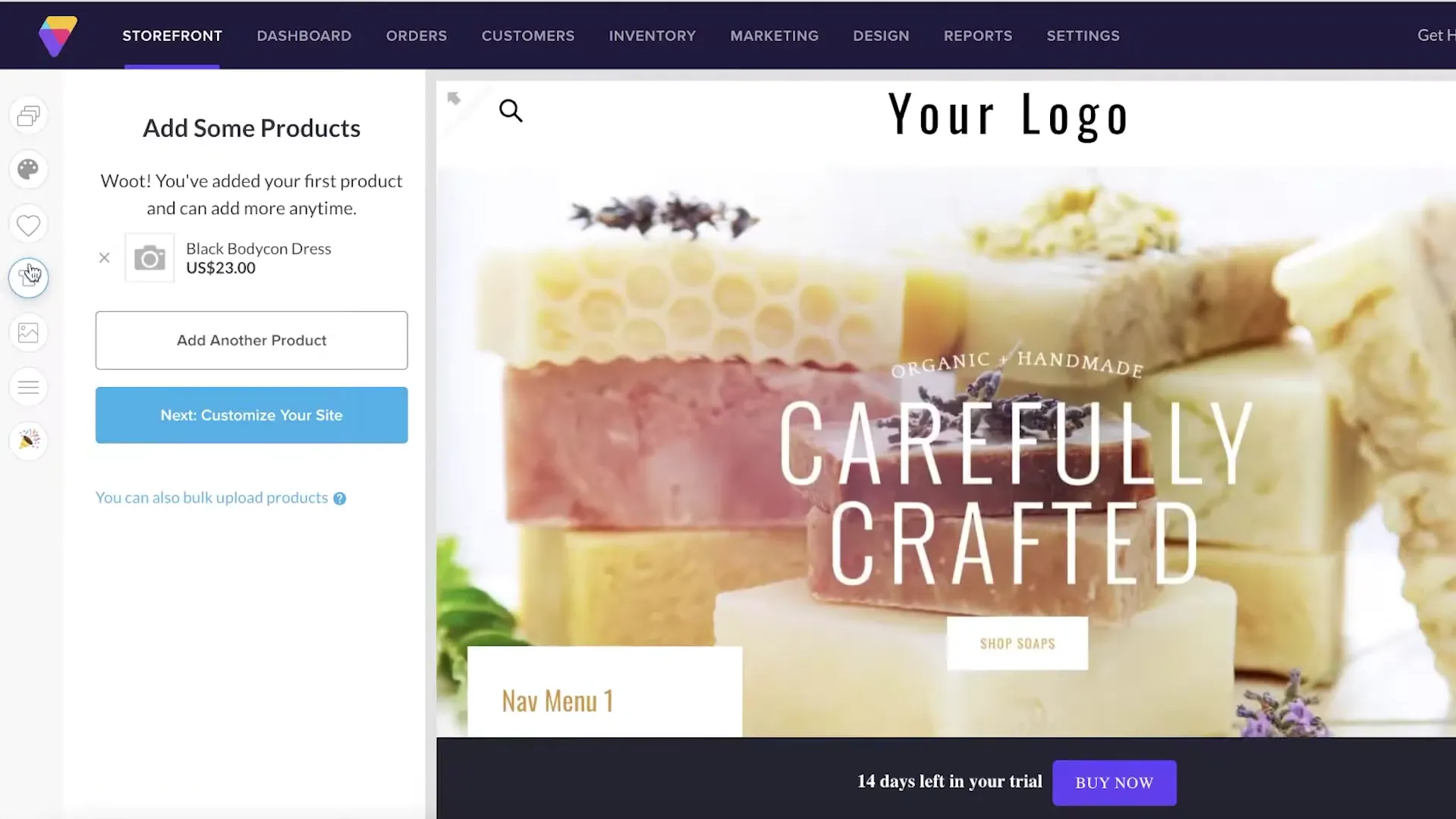
The dashboard itself is functional, but it looks different from what you see on most modern platforms. Instead of a familiar sidebar layout, Volusion places all its main sections horizontally across the top of the screen. It works once you get used to it, but it may feel a little outdated and less intuitive for new users. Still, everything you need (products, orders, analytics, etc.) is accessible without much digging.
Ecwid ease of use
Ecwid is very beginner-friendly and simplifies the setup process. Creating an account takes only a few minutes. Once you log in, you’ll see the Lightspeed-branded dashboard, which features a clear setup guide that guides you through the next steps, such as setting up your storefront, adding products, and reviewing key settings.
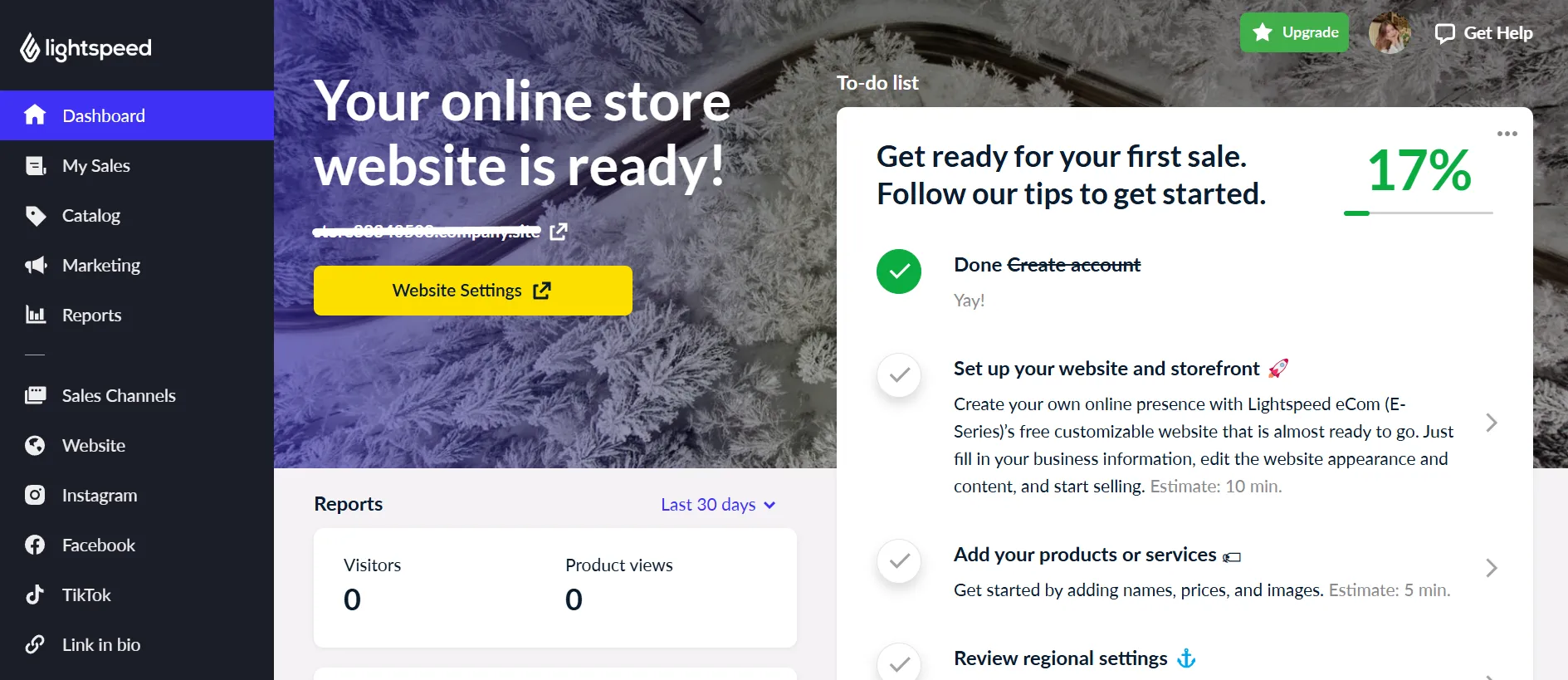
The dashboard is clean and modern, with a familiar sidebar menu that keeps everything organized, from sales and catalog to marketing and integrations. It feels intuitive, allowing even first-time users to quickly understand how to manage their store with minimal effort.
3. Themes & customization
The Verdict
In terms of themes and customization, Ecwid has a slight advantage over Volusion. Even though Volusion offers more theme options and both platforms have similar levels of customizability, Ecwid’s modern builder and built-in AI tools make the setup process more streamlined and user-friendly.
Volusion customization
Volusion offers a selection of around 24 free pre-built themes that you can quickly apply to your store using its Site Designer. If you want more variety, there’s also a wider library of about 40 eCommerce themes, which includes 11 free designs and 34 premium themes priced at $180 each.
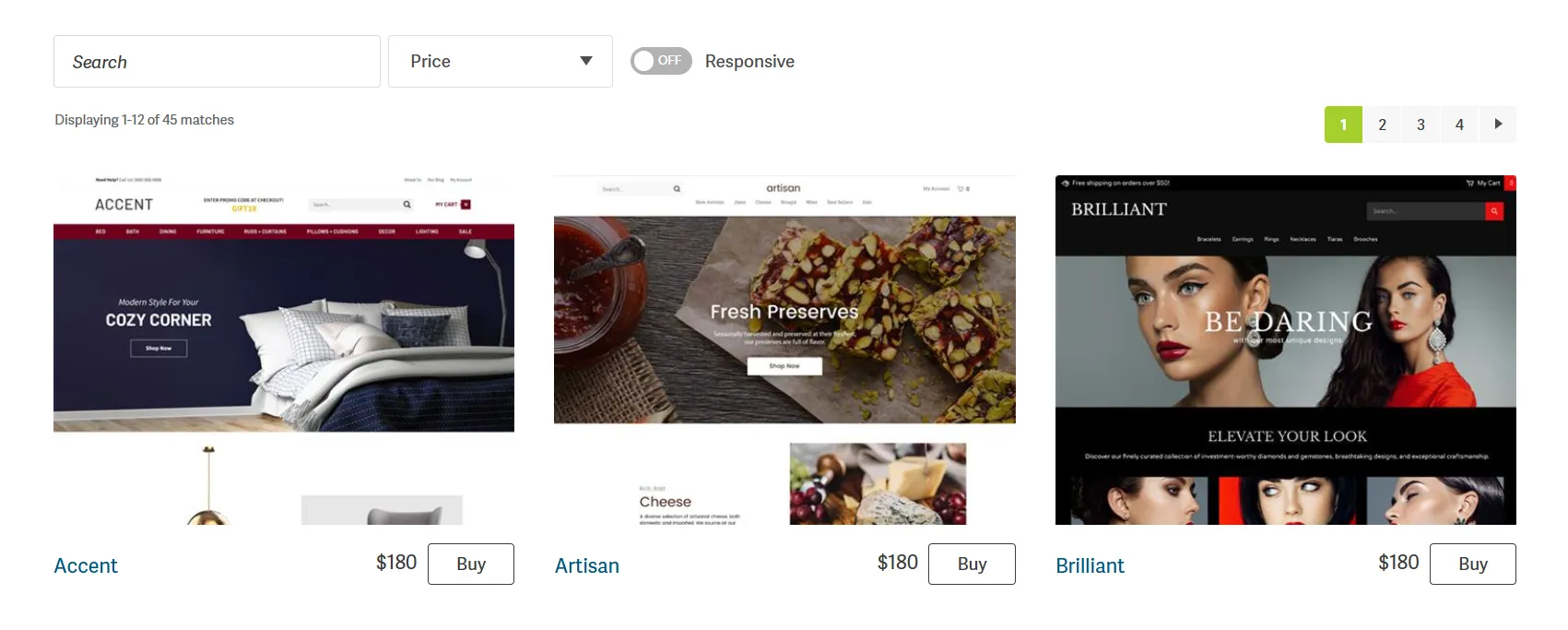
The Site Designer is a drag-and-drop tool that gives you control over the look and layout of your store without needing to code. It uses a block-based system, so you can easily move sections around, add new content blocks, and change images or text in real time. You can also customize colors, fonts, and other visual elements to better match your brand. The preview feature lets you see changes instantly, which makes the process more intuitive even for beginners.
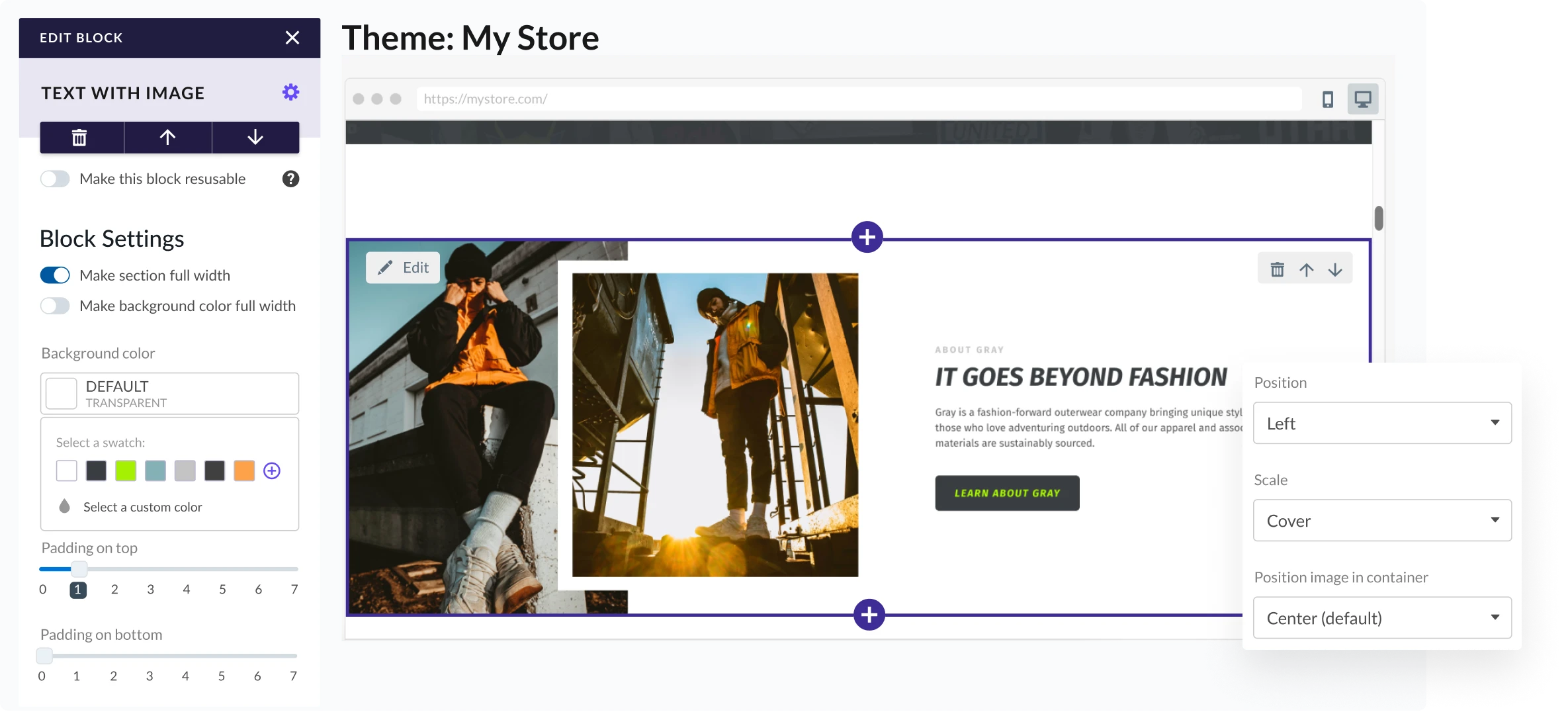
For more advanced customization, Volusion does allow access to HTML and CSS, so you can make deeper design changes if you have coding knowledge. However, it doesn’t provide full control over the backend or deep template editing like some other platforms (e.g., Shopify’s Liquid or WooCommerce’s PHP templates). Therefore, fully unique designs or highly custom layouts can be harder to achieve.
Ecwid customization
Ecwid provides a versatile selection of over 40 free templates, categorized to fit a wide range of industries, such as Apparel & Footwear, Home & Garden, and Sport & Outdoor. In the Volusion vs Ecwid comparison, these templates are more modern and visually polished, allowing you to create a professional-looking storefront right from the start.
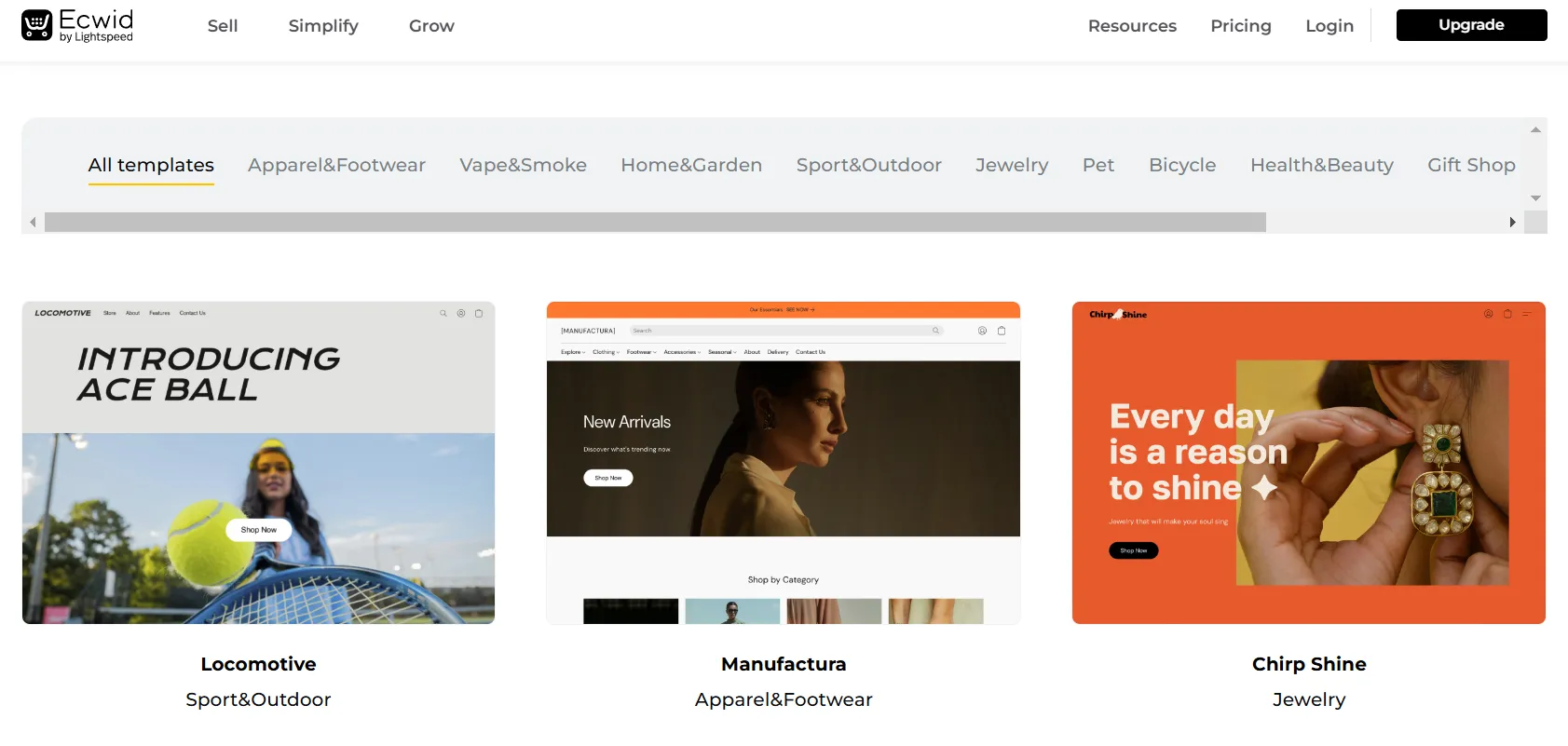
After choosing a template, Ecwid’s website builder gives you all the tools to polish your site. You can easily customize layouts, colors, fonts, and content blocks to match your brand better. The editor is intuitive and responsive, so changes appear instantly, and the interface feels modern and user-friendly. It’s designed to give small businesses a professional-looking storefront with minimal effort.

For more advanced customization, Ecwid also supports custom CSS, giving you the freedom to go beyond the default design options. This level of flexibility is similar to what Volusion offers, allowing both platforms to handle moderate design without requiring deep development work.
Ecwid goes a step further in customization by including built-in AI tools that make enhancing your store even easier. With AI-powered suggestions, you can:
- Find the perfect domain name with smart recommendations tailored to your brand.
- Enhance product images automatically, making them look professional without extra editing tools.
- Generate catchy product descriptions using AI content helpers to save time and improve your listings.
4. eCommerce features
The Verdict
In terms of eCommerce features, Ecwid is more versatile, offering subscription support, better global selling tools, and a more modern approach to managing your store. Volusion does have unlimited products on higher plans, but its overall features are more limited and less flexible for growing businesses.
To provide a clearer picture between Volusion vs Ecwid, this table highlights the features available on the middle plans of each platform, allowing you to compare them better:
Features | Volusion | Ecwid |
Product management | Supports unlimited products on higher plans with basic variants and categories. | Easy to manage products with variants, categories, and digital products. |
Inventory management | Includes stock tracking, low-stock alerts, and basic reporting, though the tools feel dated. | Real-time inventory tracking with low-stock alerts. Syncs seamlessly across online store, marketplaces, and social channels. |
Payment gateways | Supports major gateways like PayPal, Stripe, and Authorize.Net but fewer local payment options. | Offers 70+ global payment options, including PayPal, Stripe, Square, plus Apple Pay and Google Pay. |
Shipping methods | Built-in shipping calculator with real-time rates for USPS, UPS, and FedEx. Limited advanced shipping rules. | Flexible shipping settings with real-time rates. Integrates globally with carriers and supports in-store pickup and local delivery. |
Subscriptions | Does not natively support subscription products or recurring billing. | Supports subscription-based products and recurring payments on Business and Unlimited plans. |
Tax management | Basic tax settings; some automation but lacks flexibility for global tax handling. | Automated tax calculations for multiple regions with more flexibility for global selling. |
Multilingual & multi-currency | Limited multilingual support and no native multi-currency features. | Offers multilingual storefronts and automatic currency conversion for international customers. |
Abandoned cart recovery | Available on higher plans only (Professional and above). | Available on Business and Unlimited plans. Includes automated emails to recover lost sales. |
Headless eCommerce | Limited headless support; mainly tied to Volusion’s hosted storefront. | Fully headless-ready with APIs. Can embed into any site or CMS like WordPress, Wix, or Squarespace. |
Looking at these features side by side, both platforms cover the basics well, but they approach scalability differently. Volusion’s strength lies in offering unlimited products on higher plans, while Ecwid focuses more on flexibility, supporting digital products, subscriptions, and global selling.
5. SEO & marketing
The Verdict
In this Volusion vs Ecwid comparison, Ecwid has the advantage. Both handle basic SEO well, but Ecwid offers better marketing options, including social media selling and marketplace integrations, which make it easier to reach a wider customer base.
Volusion SEO & marketing
Volusion offers a solid set of built-in marketing and SEO tools to help your store gain visibility. For SEO, you can customize page titles, meta descriptions, and URLs, and the platform automatically generates sitemaps and supports canonical tags to prevent duplicate content issues.
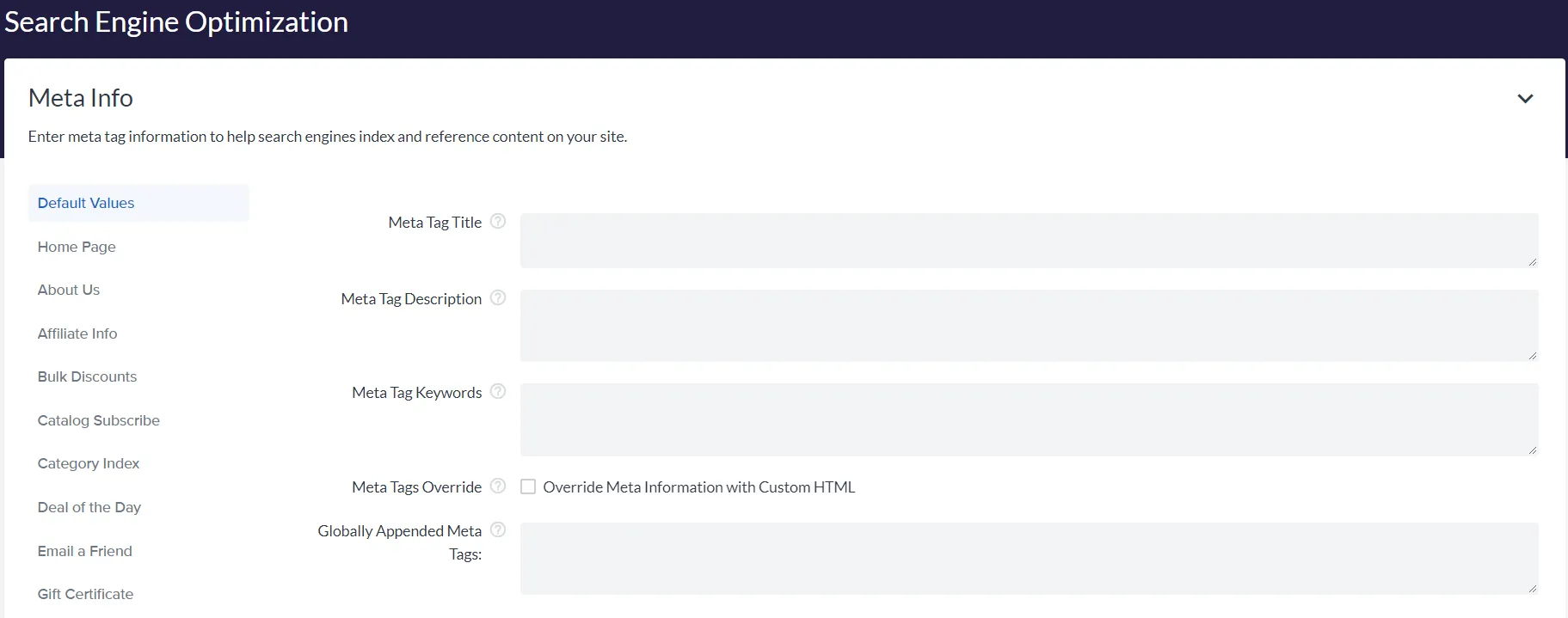
On the marketing side, you can create discounts, coupon codes, and promotions to encourage sales. There are also features for product reviews, social sharing buttons, and basic email marketing integrations. These tools cover the essentials, but they’re not as advanced or comprehensive as what you’ll find on more modern eCommerce platforms. Thus, we still recommend integrating with third-party apps for more complex campaigns.
Ecwid SEO & marketing
In comparison, Ecwid takes a more modern approach to marketing and SEO, making it easier for small businesses to reach customers across multiple channels. Its SEO settings allow you to edit page titles, meta descriptions, and product descriptions. It also supports structured data, improving how your products appear in search results.

Where Ecwid really shines is in multichannel selling. You can sync your store with Facebook, Instagram, and TikTok to sell directly on social media, or connect to marketplaces like Amazon and eBay. Google Shopping integration is built-in, making it simple to advertise products across search and shopping feeds. For email marketing, Ecwid integrates seamlessly with tools like Mailchimp, Klaviyo, and Constant Contact, allowing for automated campaigns with minimal hassle.
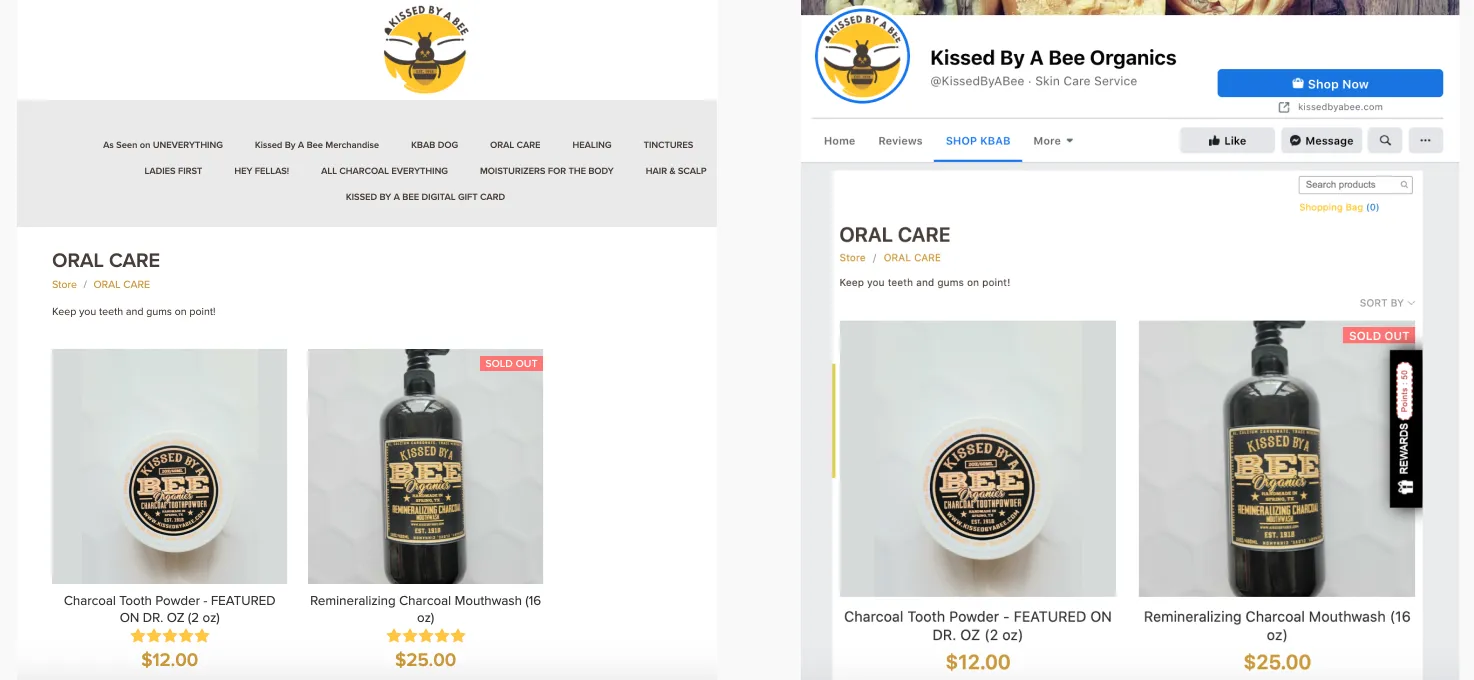
6. Apps & integration
The Verdict
In the Volusion vs Ecwid comparison, Ecwid clearly wins for both quantity and quality. Its app market is larger, with over 300 well‑maintained apps that are regularly reviewed for security and usability.
Volusion apps & integration
Volusion has an app marketplace with about 80 apps, covering essentials like dropshipping, customer support, and analytics. The selection isn’t as extensive as what you’ll find on platforms like Shopify, but it does cover the basics most small businesses need.
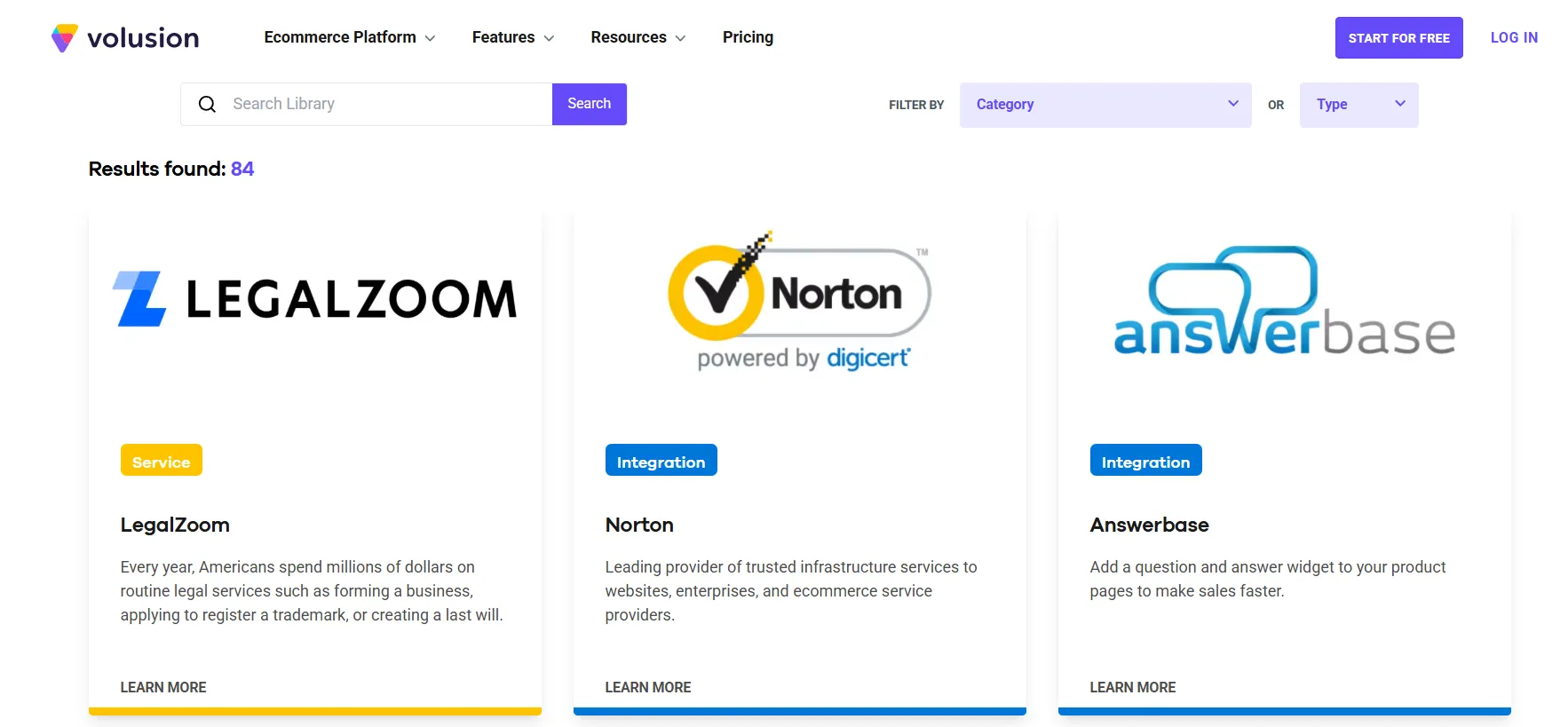
Among the available integrations, Zapier is one of the most powerful and highly recommended. It connects Volusion to over 1,000 apps, making it easier to automate tasks like sending order confirmations or syncing customer data with email marketing tools such as Klaviyo and Mailchimp. Even though the ecosystem is smaller, Zapier helps fill in many gaps by linking Volusion to a wider range of tools.
Ecwid apps & integration
The Ecwid App Market is much larger, with over 300 apps available to extend your store’s functionality. These apps cover everything from dropshipping and print‑on‑demand services to advanced analytics and customer support tools.
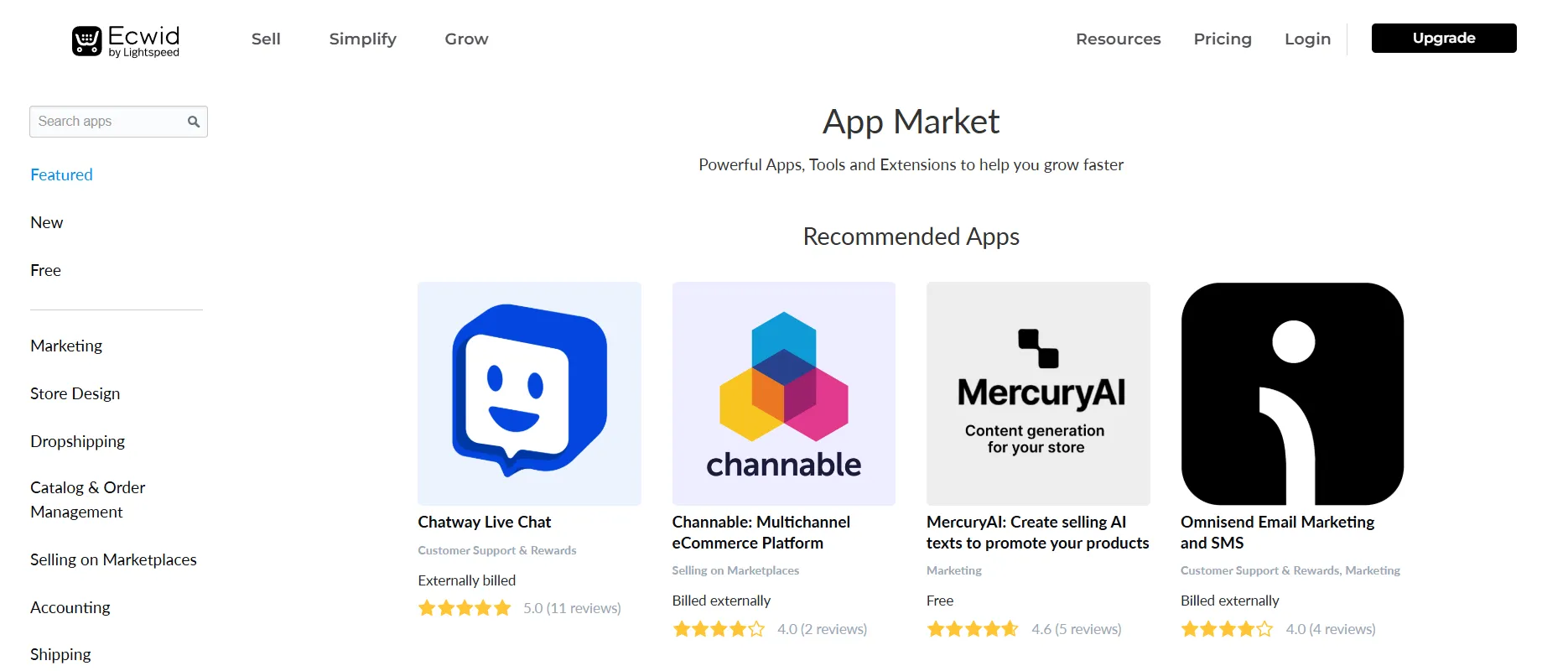
For newcomers, Ecwid makes it easier to choose by highlighting a “Featured” collection that recommends the most impactful apps for growing your store. Businesses that already have a website will also find it convenient, as Zapier integration allows Ecwid to connect seamlessly with thousands of other apps. These help automate workflows and enhance an existing setup without rebuilding from scratch.
7. Security & performance
The Verdict
It’s a tie for security and performance between Volusion vs Ecwid. Both platforms provide SSL certificates, maintain PCI DSS compliance, and deliver reliable hosting for online stores.
Volusion security & performance
Volusion includes the core security features you’d expect from a hosted eCommerce platform. Every store comes with a free SSL certificate, ensuring customer data and transactions are encrypted. The platform is PCI DSS compliant, so it meets industry standards for handling payment information securely.
In terms of performance, Volusion hosts your store on its own servers and handles updates automatically. Uptime is generally stable, but some users have reported slower page loading speeds compared to more modern platforms. Since the infrastructure feels a bit dated, it may not perform as well under heavy traffic spikes.
Ecwid security & performance
Ecwid also prioritizes security with free SSL certificates for all stores and full PCI DSS compliance, so online transactions remain safe. It runs on Amazon Web Services (AWS), which provides enterprise‑grade security and reliability. The platform also regularly updates its infrastructure to meet the latest security standards.
On the performance side, the platform is lightweight and optimized for speed. Whether you embed it into an existing site or run it as a standalone store, it loads quickly and handles traffic reliably. Its modern cloud infrastructure also makes scaling easier during busy periods, ensuring a smooth shopping experience for customers.
8. Support & customer service
The Verdict
In the Volusion vs Ecwid comparison, Ecwid has a slight edge over Volusion. Both offer live chat, email, and helpful resources, but Ecwid’s support is more responsive, its help center is better maintained, and the active user community adds an extra layer of assistance.
Volusion customer support
Volusion provides several ways to get help, including live chat, email support, and a knowledge base with tutorials and guides. The level of support you receive depends on your pricing plan. Lower-tier plans only include chat and email, while the Business plan adds phone support.
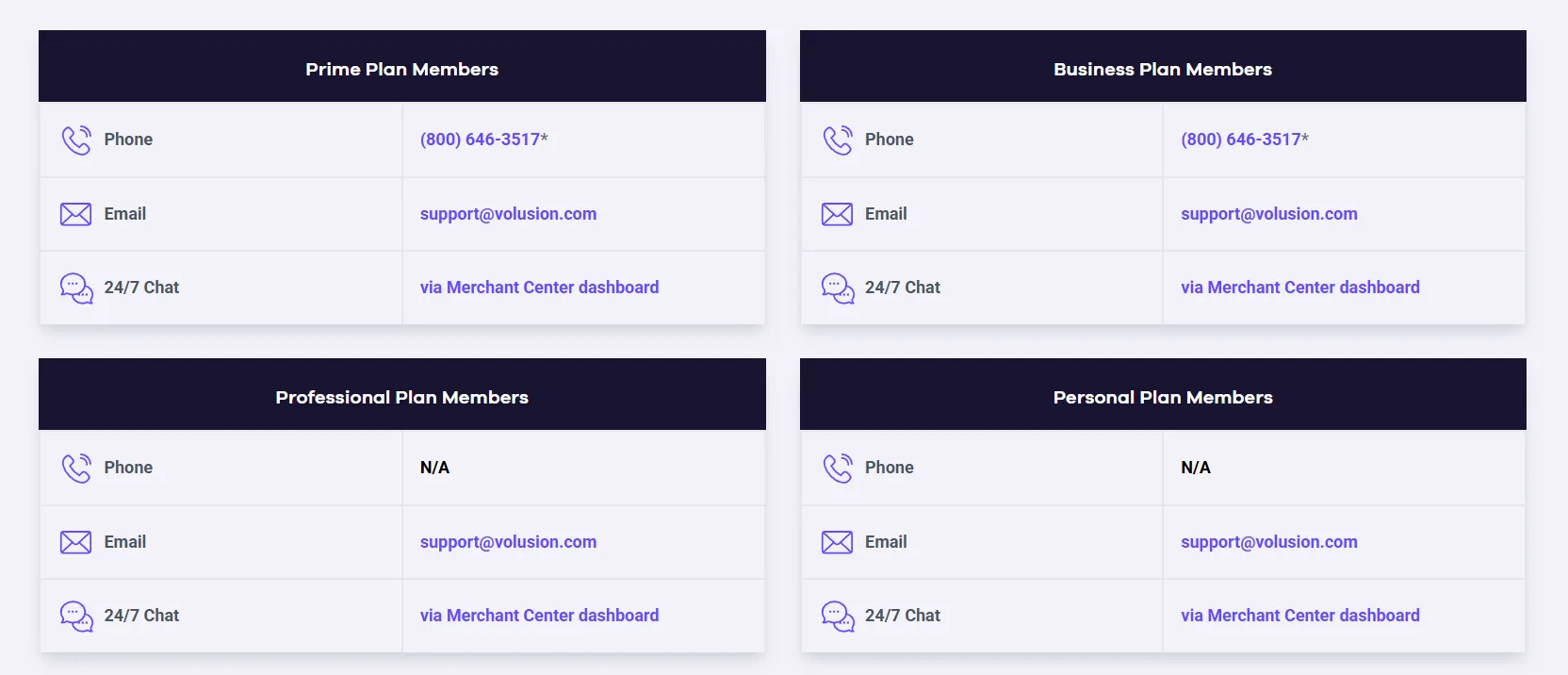
The response quality is decent for basic issues, but some users report slower response times during peak hours. The knowledge base is helpful for common questions, but it’s not as extensive or frequently updated as what you’d find on larger platforms. Overall, it works for smaller stores but may feel limited for complex issues or businesses needing faster, more proactive support.
Ecwid customer support
Ecwid offers a more consistent support experience across its plans. You can reach out via email or live chat, and higher-tier plans add priority support. The platform also offers a comprehensive help center featuring articles, tutorials, and video guides that are regularly updated.
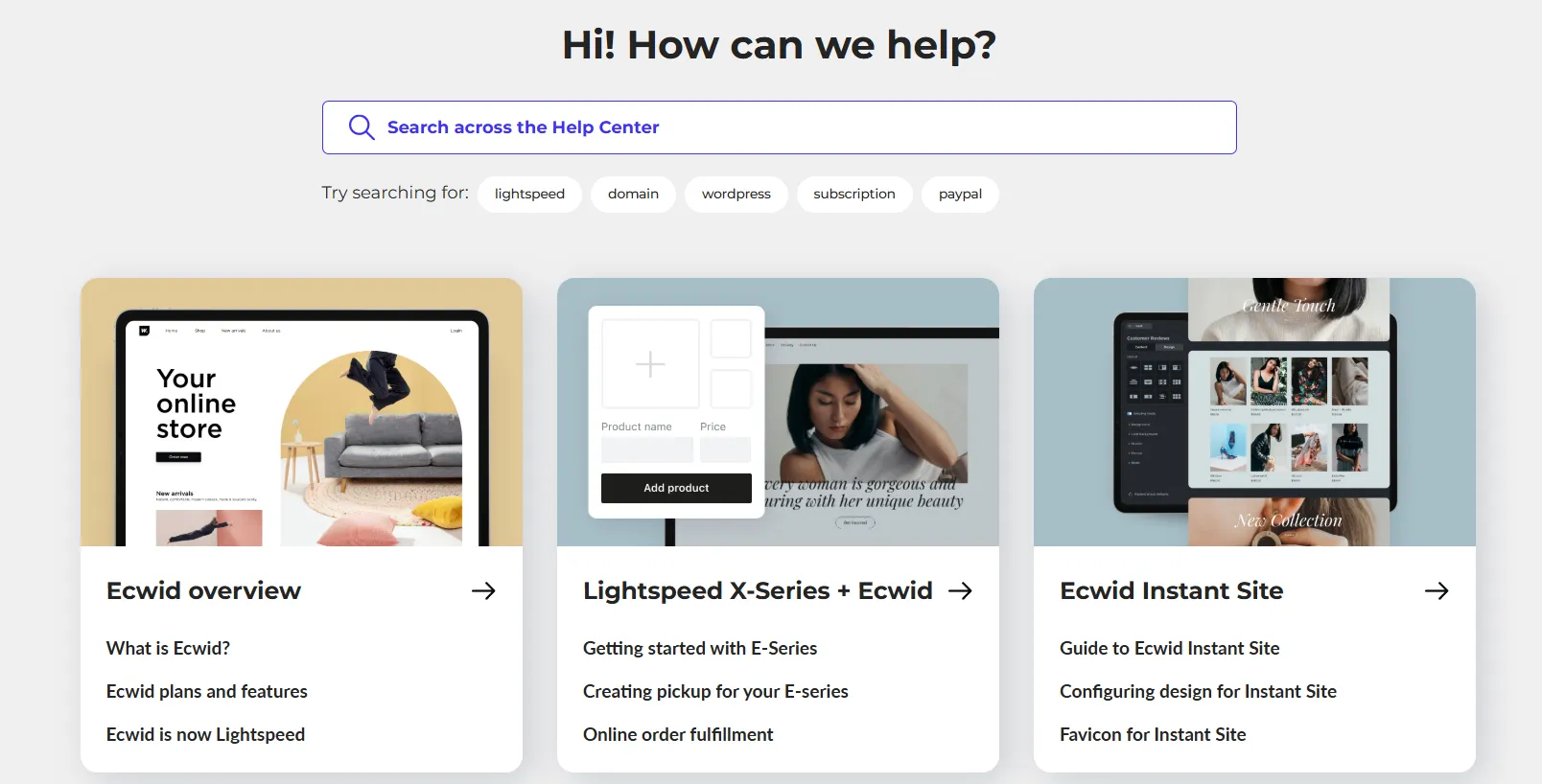
On top of that, the response times are generally quick, and the support team is known for being helpful and friendly. Additionally, Ecwid maintains an active community forum where users can exchange tips and seek advice. For growing businesses, having that extra layer of community and updated documentation makes problem-solving easier.
Volusion vs Ecwid: Which Platform is Suitable For Your Business?
Choosing between Volusion vs Ecwid depends on your business requirements and growth plans. To make the choice easier, here’s a quick breakdown of which types of businesses each platform fits best.
Volusion is more suitable for:
- Small to mid-sized retailers who want a stable, hosted platform to list and sell products without too much complexity.
- Businesses with a fixed product catalog that won’t change often.
- Merchants who prefer to keep things simple with basic marketing and eCommerce tools and aren’t focused on rapid scaling or international sales.
Ecwid is better suited for:
- Startups, growing brands, or solo entrepreneurs who want a flexible platform that can scale as their business grows.
- Businesses that already have a website and want to easily add eCommerce without rebuilding from scratch.
- Brands aiming for international reach, with support for multiple languages and currencies.
Volusion vs Ecwid: FAQs
What is better than Ecwid?
It depends on your needs. Ecwid is great for small to mid-sized businesses, especially if you already have a website and want to add eCommerce easily. However, if you need a fully hosted, enterprise-level platform with more advanced customization and a larger app ecosystem, options like Shopify or BigCommerce may be better suited.
Is Volusion safe?
Yes, Volusion is safe to use. It includes SSL certificates for all stores and is PCI DSS compliant, meaning it meets industry standards for processing and storing payment data securely. Like any hosted platform, it also handles server maintenance and security updates for you.
What are the downsides of Ecwid?
Ecwid’s biggest downside is that some features, like unlimited products and subscriptions, are only available on higher plans. Its design customization options are somewhat limited compared to fully hosted platforms, and it may not be ideal for very large or highly complex stores that need extensive backend control.
Is Volusion better than Ecwid for larger online stores?
Not really. Volusion allows unlimited products on higher plans, but its overall features, integrations, and scalability are more limited compared to modern platforms. Ecwid, while better for growing businesses, also isn’t the best fit for very large enterprise stores.
For larger operations, platforms like Shopify Plus or BigCommerce are usually a better choice.
Is Ecwid easier to set up than Volusion?
Yes, Ecwid is generally easier to set up, especially for beginners. It offers a simple setup guide right on the dashboard, and you can have a basic store running in minutes. Plus, if you already have a website, you can embed Ecwid without rebuilding everything. Volusion also has a step-by-step setup wizard, but its dashboard feels more dated and may take a little longer to get used to.
Conclusion
Hopefully, this article helped you understand the key differences between Volusion vs Ecwid and made your decision a little easier. After all, both platforms have their strengths, but the right choice depends on what matters most to you. By comparing them side by side, you can clearly see where each platform stands out and where it falls short.
If you’re planning to migrate your store to either Volusion or Ecwid, LitExtension is here to help. Our migration service makes it fast, secure, and hassle-free to transfer all your data, so you can focus on growing your business with confidence.
To support you even further on your eCommerce journey, we also share more insights on our blog and host a Facebook community group. Check them out now!

